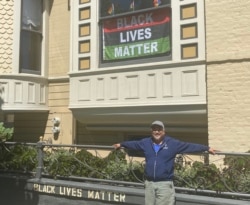When two strangers walking by stopped to accuse James “Jaime” Juanillo of defacing private property, the San Francisco man immediately took a defensive posture. He started recording the encounter, which eventually went viral, garnering more than 23 million views.
“I came up recording not because I thought there was a potential for a viral video, but because I believed that I was going to need to prove my innocence, that they were going to accuse me of a crime,” says Juanillo, 50, a Filipino American.
His “crime” was chalking a Black Lives Matter message on the retaining wall in front of the Pacific Heights home he shares with his husband and some friends. In the video, the woman, identified as Lisa Alexander, along with her male partner, approach Juanillo and question whether he lives at the property. They say they know that he does not and suggest he is breaking the law.
Juanillo is heard calmly refusing to answer any questions while challenging the woman’s apparent insinuation that a person who looks like him could not belong in the wealthy enclave.
“What I experienced is this kind of polite, everyday, ubiquitous, accepted racism where it's delivered gift wrapped and politely, stipulating your acceptance of their superiority and their supremacy,” Juanillo says. “The presumption is that they are entitled to whatever answers [to questions] that they feel like posing to a random person of color in whatever situation.”
Alexander, the woman in the video, was dubbed a “Karen.” The term originally referred to an entitled white woman who tries to use her privilege or status in society to threaten or supersede someone in an argument.
The origins of the meme — a humorous image, video or words that spread rapidly on the internet — are unknown. Some trace it to a character in the 2004 movie “Mean Girls,” while others say it came from U.S. comedian Dane Cook, who did a sketch about a friend nobody likes, a girl named Karen.
Wherever it came from, the term has evolved, according to Matt Schimkowitz, senior editor of Know Your Meme, a website that documents internet phenomena.
“I think that the term took on a more serious meaning in the past year, given that it's kind of associated with what we call, on the website, a white cop caller nickname,” he says, “which is this trend of videos of white people — typically ... white women — calling the police on people of color for just usually living their lives or doing their jobs.”
The turning point for the Karen meme, Schimkowitz says, came in May when a woman called the police after a Black birdwatcher in New York’s Central Park asked her to put a leash on her dog in keeping with a local ordinance. The man, a 57-year-old Harvard-educated science editor, recorded the encounter during which the woman threatens to tell police there is “an African American man threatening my life.”
Just who a Karen is continues to evolve with the times. The meme can also now refer to a white woman who tries to cough on people wearing masks because she thinks the coronavirus is a hoax. Or throwing a tantrum in a store after being asked to wear a mask. No male equivalent of the Karen meme has caught on.
“Which leads a lot of people to debate the sexist connotations of Karen, and why we use it, as a kind of double standard,” Schimkowitz says.
He thinks the Karen meme has reached such a high level of saturation that people online will stop using it. However, the word has become so ingrained in the culture that it is likely to continue to be used.
“Because the word is so specific in its meaning and everyone understands it, I think it will probably just continue to be used, because it's good shorthand for a society that, really more than anything right now, values brevity,” Schimkowitz says. “There's not a lot of space for long pieces about the world. We would rather just read a tweet, and in that interest, I think Karen stays with us sort of like the way a smiley face emoji does.”
Back in San Francisco, the police who responded to the call about Juanillo recognized him as a longtime resident and left without incident. Alexander and her partner released a public apology after the encounter went viral. Juanillo decided to release the video of his Karen moment to highlight what everyday racism can look like.
“Racism just doesn't mean being executed on the streets of America. Sometimes it just means being questioned for why you exist and where you exist,” Juanillo says. “Someone can call the cops — men with guns — on you for innocuous actions like designing chalk art on property that's not theirs, that they have no vested interest in. They don't feel threatened by you and yet, they're still willing to bet your entire life.”
The term and people who embody it will continue to exist, but people like Juanillo who might have previously felt helpless or vulnerable during such encounters, now have a powerful weapon of their own to deploy.
“This is no longer a world where it’s ‘he said versus she said’ or ‘he said versus he said.’ It is now a world where technology is a great equalizer,” Juanillo says, “and we all have the ability and the technology to record the truth, and justice will be visually on our side.”






